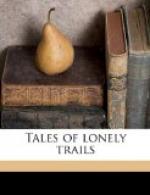We rode around the end of this slope, gradually working down into Horton Thicket, where a wild confusion of dense timber engaged my sight. Presently George trotted up behind us with the other dogs. “We lost him down on the hot dry ridges. Hounds couldn’t track him,” was all George said. Thereupon Edd blew four blasts upon his hunting-horn, which were signals to those on the stands above that the hunt was over for the day.
Even in the jungle tropics I had never seen such dense shade as this down in Horton Thicket. The timber grew close and large, and the foliage was matted, letting little sunlight through. Dark, green and brown, fragrant, cool thicket indeed it was. We came to a huge spruce tree, the largest I ever saw—Edd said eight feet through at the base, but he was conservative. It was a gnarled, bearded, gray, old monarch of the forest, with bleached, dead top. For many years it had been the home of swarms of wild honey bees. Edd said more than one bee-hunter had undertaken to cut down this spruce. This explained a number of deeply cut notches in the huge trunk. “I’ll bet Nielsen could chop it down,” declared Edd. I admitted the compliment to our brawny Norwegian axe-wielder, but added that I certainly would not let him do it, whether we were to get any honey or not.
By and bye we reached the bottom of the thicket where we crossed a swift clear cold brook. Here the smells seemed cool, sweet, wild with spruce and pine. This stream of granite water burst from a spring under a cliff. What a roar it made! I drank until I could drink no more. Huge boulders and windfalls, moved by water at flood season, obstructed the narrow stream-bed. We crossed to start climbing the north slope, and soon worked up out of the thicket upon a steep, rocky slope, with isolated pines. We struck a deer-trail hard to follow. Above me loomed the pine-tipped rim, with its crags, cliffs, pinnacles, and walls, all gray, seamed and stained, and in some clefts blazes of deep red and yellow foliage.
When we surmounted the slope, and eventually reached camp, I found Isbel entertaining strangers, men of rough garb, evidently riders of the range. That was all right, but I did not like his prodigality with our swiftly diminishing store of eatables.
To conclude about Isbel—matters pertaining to our commissary department, during the next few days, went from bad to worse. Doyle advised me not to take Isbel to task, and was rather evasive of reasons for so advising me. Of course I listened and attended to my old guide’s advice, but I fretted under the restraint. We had a spell of bad weather, wind and rain, and hail off and on, and at length, the third day, a cold drizzling snow. During this spell we did but little hunting. The weather changed, and the day afterward I rode my mean horse twenty miles on a deer hunt. We saw one buck. Upon our arrival at camp, about four o’clock, which hour was too early for dinner, I was surprised and angered to find Isbel eating an elaborate meal with three more strange, rough-appearing men. Doyle looked serious. Nielsen had a sharp glint in his gray eye. As for myself, this procedure of our cook’s was more than I could stand.




